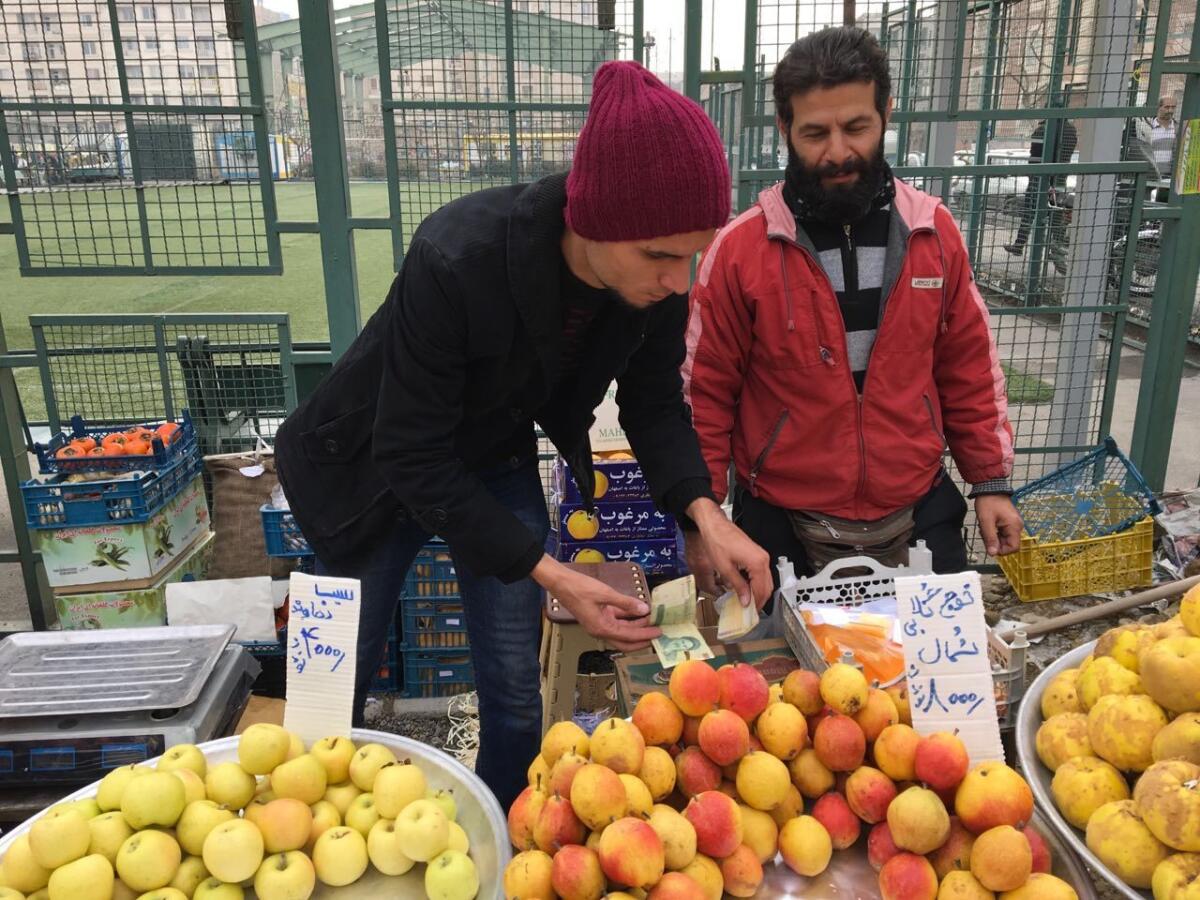Iran’s newest fighters are sidewalk vendors, ‘ready to struggle to our last drop of blood’

From his stall piled with pears, apples, dates and the dark brown fruit of oak trees, Ali Jafari watches the gentle stream of shoppers at the weekly sidewalk market.
They are bundled in scarves and long thermal T-shirts on an overcast, chilly morning on the first Friday of the year. As customers mill from stall to stall, the chatter is of the economy, inflation and the merits of the Hollywood movies for sale on pirated DVDs.
Jafari, a 41-year-old former auto factory worker, started selling fruit three years ago in this middle-class neighborhood in western Tehran, on a dirt lot next to a mini soccer field and low-rise apartments.
A married father of two, he earns about $750 a month from the stall, more than three times what he made working at the state-owned auto plant.
“How else could I survive?” said Jafari, sporting a thick black beard.
We are not well-connected top managers who can embezzle funds, take zero-interest loans and make a fortune.
— Asgar Etemadi
One night the week before, bulldozers had rolled in and dumped piles of dirt and rubble where the market has sat for the past decade. It was the latest attempt by Tehran authorities to dismantle informal bazaars across the capital city on the grounds that they block traffic or lack adequate permits.
Jafari and other vendors who rent stalls — rates are as much as $8 per day for a 50-square-foot patch — dug through the dirt with their hands to flatten the ground so they could set up their folding tables and metal clothing racks and resume selling as usual.
“We are ready to struggle up to our last drop of blood,” Jafari said.
A weekly bazaar might not seem worthy of such a serious battle. But in a country with rampant unemployment — the official unemployment rate is 12%, though it is widely believed to be much higher — vendors have become symbols of the struggle for decent jobs and affordable commerce.
Over the last two decades, clashes have periodically broken out across Iran between stall owners and the municipal authorities from whom they rent space. Vendors have set themselves on fire or committed suicide in public to protest what they say are arbitrary raids or extortion attempts by local officials and security forces.
That has helped make the vendors a cause celebre among Iran’s educated liberal class, many of whom post messages of support on Facebook or the popular mobile messaging app Telegram.
With presidential elections due in June and public anger rising over the inflated salaries of top government employees, the fight over Iran’s humble sidewalk markets has taken on a political tenor. City officials say they are only trying to relieve congestion and hope to move the markets to outlying areas — but vendors say that would kill their business.
“The municipality has no better alternative for us, so we are defiant and will resist them up to the end,” said Jafari’s cousin, Asgar Etemadi, who is at the market selling rice, grown in the paddies of northern Iran.
Etemadi hands out business cards stamped with his cellphone number to potential customers, promising home delivery. At 30, he said he has no other job opportunities, and asks rhetorically what else he can do.
“Begging, robbing, pickpocketing?” Etemadi said. “We are not well-connected top managers who can embezzle funds, take zero-interest loans and make a fortune.”
He and other vendors passed around a petition, collecting signatures from shoppers who said they approved of having the market in the area. The aroma of noodle soup and cotton candy wafted through the crisp air.
Amine Ansari, a 65-year-old grandmother, gave up her job as a primary schoolteacher seven years ago to sell shawls and scarves. She earns $500 a month, far more than her teacher’s salary, allowing her to buy food for her large extended family.
But a few weeks ago, authorities kicked her and other vendors out of a weekly market in northwestern Tehran. She shuffles between multiple bazaars in the city while the vendors negotiate to get their old space back, but Ansari worries that the city representative will raise their rent.
“Of course he increases the price of every square meter from time to time, under the pretext that people in the neighborhood are unhappy with having the market there,” Ansari said. “But who is unhappy? Look at the people who buy from us — they are from the same neighborhood!”
Stall owners typically pay rent to a nayeb, the Persian word for a representative of the local municipality. But vendors said the nayeb usually rents the entire market area from the city, and raises their costs to increase his profits.
When dirt is dumped on the market or access is restricted, the nayeb usually follows up by demanding more money, said Hamid Godarzi, a vendor selling socks, gloves and underwear out of a small pickup truck that doubles as his warehouse.
“We are fleeced by the city representative, and we have no other option,” said Godarzi, a 42-year-old father of two. “Until six years ago, I was a cattle breeder. But then former President Mahmoud Ahmadinejad imported meat and milk from abroad to reduce the prices inside the country. I went bankrupt and ended up working here and at other markets with my wife.”
Many of the vendors are refugees from Iranian industries that failed as government mismanagement and international sanctions bit into the economy.
Gray-haired Hossain Sehati, who was a tambourine player in cabaret bands before the 1979 Islamic revolution ended Western-style music in Iran, now sells women’s clothing out of his ancient white sedan. He said there are more young vendors now as a new generation grows frustrated with the lack of employment, even for those with an education.
Ali Mombini, a 30-year-old pomegranate seller, dropped out of high school and began working at the market as a teenager, figuring it was more valuable than studying.
“All my cousins are educated and jobless,” said Mombini, wearing a camouflage T-shirt, his hair styled upward like the bristles of a paintbrush. “So I joined the market. I earn enough to pay the monthly rent for my own house and make ends meet, thank God.”
Knowing he and other hawkers will resist, Mombini added, “I don’t think the city will dare to kick us out of here for good.”
Mostaghim is a special correspondent. Staff writer Shashank Bengali contributed to this report from Mumbai, India.
ALSO
More women in Iran are forgoing marriage. One reason? The men aren’t good enough
The U.S. may be the ‘Great Satan’ in Iran, but some still want to win the U.S. visa lottery
The world’s fastest animal is in a race for survival in Iran
More to Read
Start your day right
Sign up for Essential California for news, features and recommendations from the L.A. Times and beyond in your inbox six days a week.
You may occasionally receive promotional content from the Los Angeles Times.






